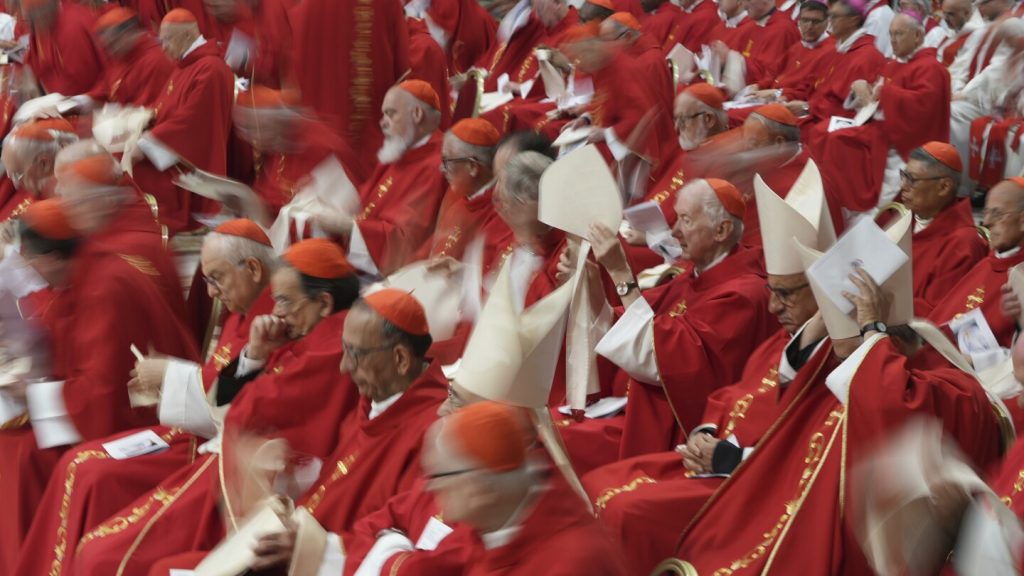What is a conclave?
VATICAN CITY (AP) — A conclave is the centuries-old election of a pope that derives its name from the Italian “con clave” (with a key) to underscore that cardinals are sequestered until they find a winner.
Cardinals have no contact with the outside world after the master of liturgical ceremonies utters the words “Extra Omnes” the Latin phrase for “all out,” to ask all those present except the cardinal electors to leave the Sistine Chapel to begin the voting process.
In between votes, the cardinals will be staying at the Domus Santa Marta hotel in Vatican City and possibly another nearby Vatican residence, since there are more cardinal electors than Santa Marta hotel rooms.
How will it work?
The conclave begins May 7, in the afternoon.
The day begins with Mass celebrated in the morning by the dean of the College of Cardinals, Cardinal Giovanni Battista Re.
In the afternoon, the cardinals process into the Sistine Chapel and take their seats. A priest delivers a meditation and the cardinals take an oath. After the “Extra Omnes,” the conclave begins.
Unless there are any outstanding questions or problems, cardinals take a single vote the afternoon of May 7, seeking a two-thirds majority. If they don’t find a winner on the first ballot, they retire for the evening and return to the Sistine Chapel the following morning.
They can take up to two votes each morning, and two each afternoon until they have a winner.
Who gets to be part of the conclave?
Only cardinals under age 80 are eligible to vote. Current regulations notionally limit the number of electors to 120, but popes often exceeded that ceiling and today there are 135 who are eligible.
Those cardinals who are over 80 can’t vote but can participate in pre-conclave meetings, known as general congregations, in which church problems are discussed. It was in these meetings in 2013 that then-Cardinal Jorge Mario Bergoglio spoke about the need for the church to go to the “existential peripheries” to find those who suffer — an off-the-cuff speech that helped his election.
Are there major differences between this conclave and previous ones?
St. John Paul II rewrote the regulations on papal elections in a 1996 document that remains largely in force today, though Pope Benedict XVI amended it twice before he resigned.
Francis didn’t introduce any changes into the conclave itself, though his influence will surely be felt given he named 108 of the 135 cardinal-electors who are eligible to vote.
Benedict’s most notable change to the original 1996 document was to exclude the possibility that a pope could be elected by a simple majority if voting was stalemated. Benedict decreed that a two-thirds majority is always needed, no matter how long it takes. He did so to prevent cardinals from holding out for the 12 days foreseen by John Paul and then pushing through a candidate with a slim majority.
If the conclave lasts that long, the top two vote-getters go to a runoff, with a two-thirds majority required to win. Neither of the top two candidates casts a ballot in the runoff.
Who is eligible to be elected pope?
Any baptized Catholic male is eligible to be pope, but since 1378, only cardinals have been selected. Cardinals over age 80 can be elected pope, even if they can’t be in the room to cast a ballot.
Why aren’t women part of the process?
Francis and popes before him have upheld the ban on ordaining women as priests, which precludes them from being pope. Under Catholic doctrine, the priesthood is reserved for men because Christ chose only men as his 12 apostles. The teaching is considered divinely inspired and infallible.
So, the voting process is a secret?
Benedict tightened the oath of secrecy in the conclave, making clear that anyone who reveals what went on inside faces automatic excommunication.
In John Paul’s rules, excommunication was always a possibility, but Benedict revised the oath that liturgical assistants and secretaries take to make it explicit, saying they must observe “absolute and perpetual secrecy” and explicitly refrain from using any audio or video recording devices.
They now declare: “I take this oath fully aware that an infraction thereof will incur the penalty of automatic excommunication reserved to the Apostolic See. So help me God and these Holy Gospels, which I touch with my hand.”
How does the conclave announce that they’ve selected a new pope?
After the ballots are pierced, they are burned in a cylindrical stove at the end of the voting session. Black smoke from the Sistine Chapel chimney means no decision; white smoke signals the cardinals have chosen a pope and that he has accepted.
Chemical cartridges are added to ensure there is no confusion over the color. To produce black smoke, a cartridge containing potassium perchlorate, anthracene — the component of coal tar — and sulfur is burned with the ballots. For white smoke, a cartridge of potassium chlorate, lactose and chloroform resin is burned with the ballots.
Bells also are rung to signal the election of a pope, for further clarity.
The new pope is introduced from the loggia overlooking St. Peter’s Square with the words, “Habemus Papam!” (“We have a pope!”) and his chosen papal name. The new pope then emerges and gives his first blessing.
___
Associated Press religion coverage receives support through the AP’s collaboration with The Conversation US, with funding from Lilly Endowment Inc. The AP is solely responsible for this content.


